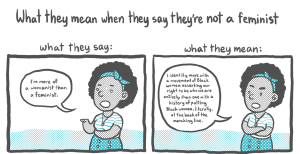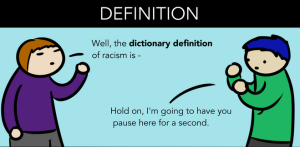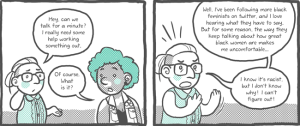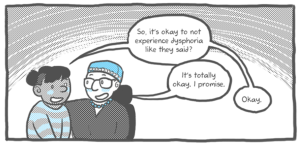Originally published on Captain Glittertoes and republished here with the author’s permission.
(Content Warning: Cissexism/transphobia in therapy, saneism, suicidal ideation)
This letter is pretty self-explanatory, but I want to give a brief introduction.
I had been seeing this therapist on and off for six years, and it was only after we stopped seeing each other, mostly for reasons unrelated to the content of this letter, that I realized the full extent of what had happened in that office in terms of my gender.
This is something that is still very painful for me to process, but I am sharing this (slightly edited) letter with you all because I hope that sharing my story will help other people in similar situations, or other people who are considering therapy.
If any providers are reading this post, take this post to heart and consider if any of it applies to you. If it does, make changes to your practice now.
Written: 5/1/14
Sent: 5/17/14
Dear [Former Therapist #1],
I have realized in the past few weeks that there is something more I need to say to you.
Feeling both anger and loss, caring about and valuing much of our therapeutic time together while realizing how you hurt and utterly failed me in this way – it isn’t an easy combination of feelings.
When someone has both given so much and also deprived me of something so important, the emotions are not easy to navigate.
I know that you have always had good intentions for me, but good intentions and positive effects are, as you must know, not the same, often. I am going to give you some feedback here that I hope you will take to heart, so that you can have a positive impact and a practice where all clients are treated equally.
Although I am angry about this, and I wanted to show you that impact in this letter, I also wish you the best in implementing these changes. Please get in touch with me if you need further input, or if you otherwise want to respond.
I talked with you in one of our sessions a few months ago about my doubts and worries about us working together again. I told you that you had shot me down years ago when I had first brought up questioning my gender to you. What I didn’t do then is remind you what you had said to me.
I don’t remember every detail of those conversations we had when I was eighteen, but I do remember the traumatizing parts. I remember that, back in what must have been our first or second session, you asked if I wanted a penis.
Uncomfortable, and confused as to whether this was the only measure of transness, I said that I didn’t think so. Shortly afterwards, I think you must have concluded that I wasn’t trans, or I must have concluded that I didn’t want to repeat that uncomfortable conversation, because we stopped talking about it for a while.
Later, maybe months or a year later, I worked up my courage and brought it up to you again. You said that you thought I had penis envy or wanted a grab at male privilege. At the time, I was too clueless about feminism to know what you meant, so I mentally shrugged.
You said that I wasn’t trans. “But you’re so feminine!” you said.
This was especially hurtful, given my current gender identity. I don’t identify with the word “feminine,” but me having some characteristics that get categorized that way doesn’t mean that I am a woman.
I didn’t talk with you about it again until five years later, this current year, when my internalized transphobia and gender dysphoria (among other things) was making me suicidal.
I had buried it for some time, but I found a journal entry that showed that even in the midst of that fog, I was aware of my dysphoria. And a lot of why I’d buried it was because I hadn’t been met with affirmation from you at all.
When I brought up my gender identity as one of my concerns about working with you again, you showed that you had evolved in some ways. You told me that you had been naive then, and that you were sorry. (But I don’t think you remember what you said! At least, I hope you didn’t, with that response.)
You said that one of a therapist’s most important jobs is to eliminate their prejudices, and now you have no personal investment in your clients’ genders.
You said that you understand that for people who don’t fit into the binary, trying to fit them into the opposite-gender box can be just as damaging. (Here, given that I hadn’t talked about my gender with you in five years, I felt you were subtly gendering me again.) Then you said, “Given all the evidence, I think it’s time for a reevaluation.”
This final sentence shows how much further you need to go: You do not get to evaluate my gender. You do not get to tell me who I am.
Not any more than you get to tell your cis clients who they are and what genders they should be. Not only had you led me away from my true self for an extra six years, but you invalidated my gender identity and used pathetic tropes to degrade who I am (trans men don’t just transition for a grab at male privilege!).
And the words “penis envy” should never be uttered with any kind of seriousness in a gender therapist’s office – not to mention that you seemed to think inquiring about my thoughts on my genitalia was a good way to both break the ice and determine my gender.
You now were judging yourself professionally fit to make those calls again!
Instead of realizing the significant damage you had wrought on me (and probably many other trans clients), instead of working tirelessly to correct that damage, you simply said that I might be able to convince you, the ultimate authority on my gender, that I am trans – this time around.
As a first-year in college, I specifically sought out gender specialists so I could start exploring my gender identity. I naively thought that it was a safe space to do so, and foolishly bought into the idea that I could trust my therapist over myself.
While I know that your statements don’t hold complete power over me, and, of course, they don’t determine my gender, your authority played a large role in squelching my shy early feelings of my true self, feelings I’d been conscious of as trans since high school, but had been waiting for a place to show.
It is true, also, that especially in the early stages of gender formation, we tend to listen to others over ourselves. You have a huge responsibility!
Had I received nurturing and competent care when I was eighteen, I might be in a very different place today.
Many of my mental health issues would at least be different, if not lessened or resolved. I might have been exposed to less or different trauma. I might even be a few inches taller, if I’d decided that testosterone was the way to go! I’d already be myself. Maybe I wouldn’t have gone to the point of considering suicide to get here.
I think that you still don’t understand the gravity of what you did five years ago. You still don’t understand the danger of labeling yourself an expert on others’ genders, or the absolute destructiveness of the gatekeeper model of trans care.
In many ways, you taught me how to advocate for myself in therapy, and how to break down the barriers of authority between therapist and client. Yet you still cling to authority in this way.
I shouldn’t have to convince you of who I am. I am certain that you don’t ask your cisgender clients to do so. I should be able to simply be, in therapy of all places. I should be supported in all ways to become more myself!
Your discouragement took away six years of my life as myself. It likely took away many others’. Please consider what amends you might be able to make with other people you have harmed through your prejudice. You have a responsibility to your current and former clients to do so. If you fail to do this, you continue to fail the trans community.
Reach out to former clients and apologize, and ask if there is anything you could possibly do to connect them to resources or help now.
Check in with current clients to be sure they feel affirmed. Never “evaluate” anyone’s gender again. Ask for accountability and feedback from the trans community and other gender specialists (maybe them, but having met many of them, a lot of them seem as or more messed up).
Please look deeply into yourself and your practice, in these ways and/or others (it is ultimately your responsibility to figure this part out), to make changes now for affirming, egalitarian care. You know the stats – lives are on the line.
One more thing. I am telling you all these things, taking this time and energy, because I have seen you walk the walk of eliminating prejudice before. I hope that my trust that I have placed in you is not ill-spent. I have faith that you will take this feedback seriously and do your best to right these wrongs.
Your former client,
Still fucking known as,
[Birth name]*
*Since this letter was written, I have started trying [current name] and using they/them pronouns.
Search our 3000+ articles!
Read our articles about:
Our online racial justice training
Used by hundreds of universities, non-profits, and businesses.
Click to learn more





















